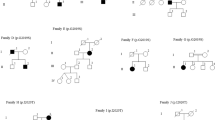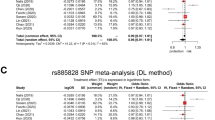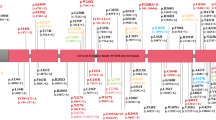Abstract
A heterozygous loss-of-function variant in lin-28 homolog A (LIN28A) was recently reported as a novel pathogenic gene in patients with PD from Korea. Two patients harboring LIN28A variants had early- or middle-aged-onset PD with good responses to levodopa. In the current study, we aimed to identify the prevalence of LIN28A variants among PD patients of Japanese origin. We performed genetic sequencing of 284 patients with early-onset PD. We then estimated the frequency and functional effect of each variant using prediction tools. We identified three different rare variants in LIN28A (rs4623750, c.228 + 49 C > T; rs199541048, c.*7 A > G; and rs4659441, c.*43 C > T). The frequency of each variant in the PD patients did not differ from that of the general population. No variants were identified in the amino acid-coding regions. Our results do not support a strong association of LIN28A with early-onset PD among Japanese patients.
This is a preview of subscription content, access via your institution
Access options
Subscribe to this journal
Receive 12 print issues and online access
$259.00 per year
only $21.58 per issue
Buy this article
- Purchase on Springer Link
- Instant access to full article PDF
Prices may be subject to local taxes which are calculated during checkout
Similar content being viewed by others
References
de Lau LM, Breteler MM. Epidemiology of Parkinson’s disease. Lancet Neurol. 2006;5:525–35.
Bloem BR, Okun MS, Klein C. Parkinson’s disease. Lancet. 2021;397:2284–303.
Deng H, Wang P, Jankovic J. The genetics of Parkinson disease. Ageing Res Rev. 2018;42:72–85.
Rhee YH, Kim TH, Jo AY, Chang MY, Park CH, Kim SM, et al. LIN28A enhances the therapeutic potential of cultured neural stem cells in a Parkinson’s disease model. Brain. 2016;139:2722–39.
Chang MY, Oh B, Choi JE, Sulistio YA, Woo HJ, Jo A, et al. LIN28A loss of function is associated with Parkinson’s disease pathogenesis. EMBO J. 2019;38:e101196.
Diez-Fairen M, Makarious MB, Bandres-Ciga S, Blauwendraat C. International Parkinson’s Disease Genomics C. Assessment of LIN28A variants in Parkinson’s disease in large European cohorts. Neurobiol Aging. 2021;100:118 e1–18 e3.
Gu X, Hou Y, Chen Y, Ou R, Cao B, Wei Q, et al. Comprehensive analysis of LIN28A in Chinese patients with early onset Parkinson’s disease. Front Genet. 2021;12:740096.
Huang X, Zhao Y, Pan H, Wang Y, Liu Z, Xu Q, et al. The association between LIN28A gene rare variants and Parkinson’s disease in Chinese population. Gene. 2022;829:146515.
Gibb WR, Lees AJ. The relevance of the Lewy body to the pathogenesis of idiopathic Parkinson’s disease. J Neurol Neurosurg Psychiatry. 1988;51:745–52.
Balzer E, Heine C, Jiang Q, Lee VM, Moss EG. LIN28 alters cell fate succession and acts independently of the let-7 microRNA during neurogliogenesis in vitro. Development. 2010;137:891–900.
Patterson M, Gaeta X, Loo K, Edwards M, Smale S, Cinkornpumin J, et al. let-7 miRNAs can act through notch to regulate human gliogenesis. Stem Cell Rep. 2014;3:758–73.
Yang M, Yang SL, Herrlinger S, Liang C, Dzieciatkowska M, Hansen KC, et al. Lin28 promotes the proliferative capacity of neural progenitor cells in brain development. Development. 2015;142:1616–27.
Hwang YJ, Jung GS, Jeon W, Lee KM. Lin28a ameliorates glucotoxicity-induced beta-cell dysfunction and apoptosis. BMB Rep. 2021;54:215–20.
Athauda D, Maclagan K, Skene SS, Bajwa-Joseph M, Letchford D, Chowdhury K, et al. Exenatide once weekly versus placebo in Parkinson’s disease: a randomised, double-blind, placebo-controlled trial. Lancet. 2017;390:1664–75.
Brauer R, Wei L, Ma T, Athauda D, Girges C, Vijiaratnam N, et al. Diabetes medications and risk of Parkinson’s disease: a cohort study of patients with diabetes. Brain. 2020;143:3067–76.
Acknowledgements
We thank Bronwen Gardner, PhD, from Edanz (https://jp.edanz.com/ac) for editing a draft of this manuscript. This work was supported by JSPS KAKENHI [grant numbers: 21K07283 to LY, 18K07536 to HY, 20K07893 to KN, 19K08003 to MF, and 21H04820 to NH]; High Technology Research Center Grant from the Ministry of Education, Culture, Sports, Science and Technology, Japan; Subsidies for Current Expenditures to Private Institutions of Higher Education from the Promotion and Mutual Aid Corporation for Private Schools of Japan; and GAPFREE from AMED (21ak0101125h0002). This work was performed, in part, at the Intractable Disease Research Center, Juntendo University Graduate School of Medicine.
Author information
Authors and Affiliations
Corresponding author
Ethics declarations
Competing interests
The authors declare no competing interests.
Additional information
Publisher’s note Springer Nature remains neutral with regard to jurisdictional claims in published maps and institutional affiliations.
Supplementary information
Rights and permissions
Springer Nature or its licensor (e.g. a society or other partner) holds exclusive rights to this article under a publishing agreement with the author(s) or other rightsholder(s); author self-archiving of the accepted manuscript version of this article is solely governed by the terms of such publishing agreement and applicable law.
About this article
Cite this article
Peng, H., Li, Y., Yoshino, H. et al. Analysis of LIN28A variants in patients with Parkinson’s disease. J Hum Genet 68, 329–331 (2023). https://doi.org/10.1038/s10038-022-01109-x
Received:
Revised:
Accepted:
Published:
Issue Date:
DOI: https://doi.org/10.1038/s10038-022-01109-x



